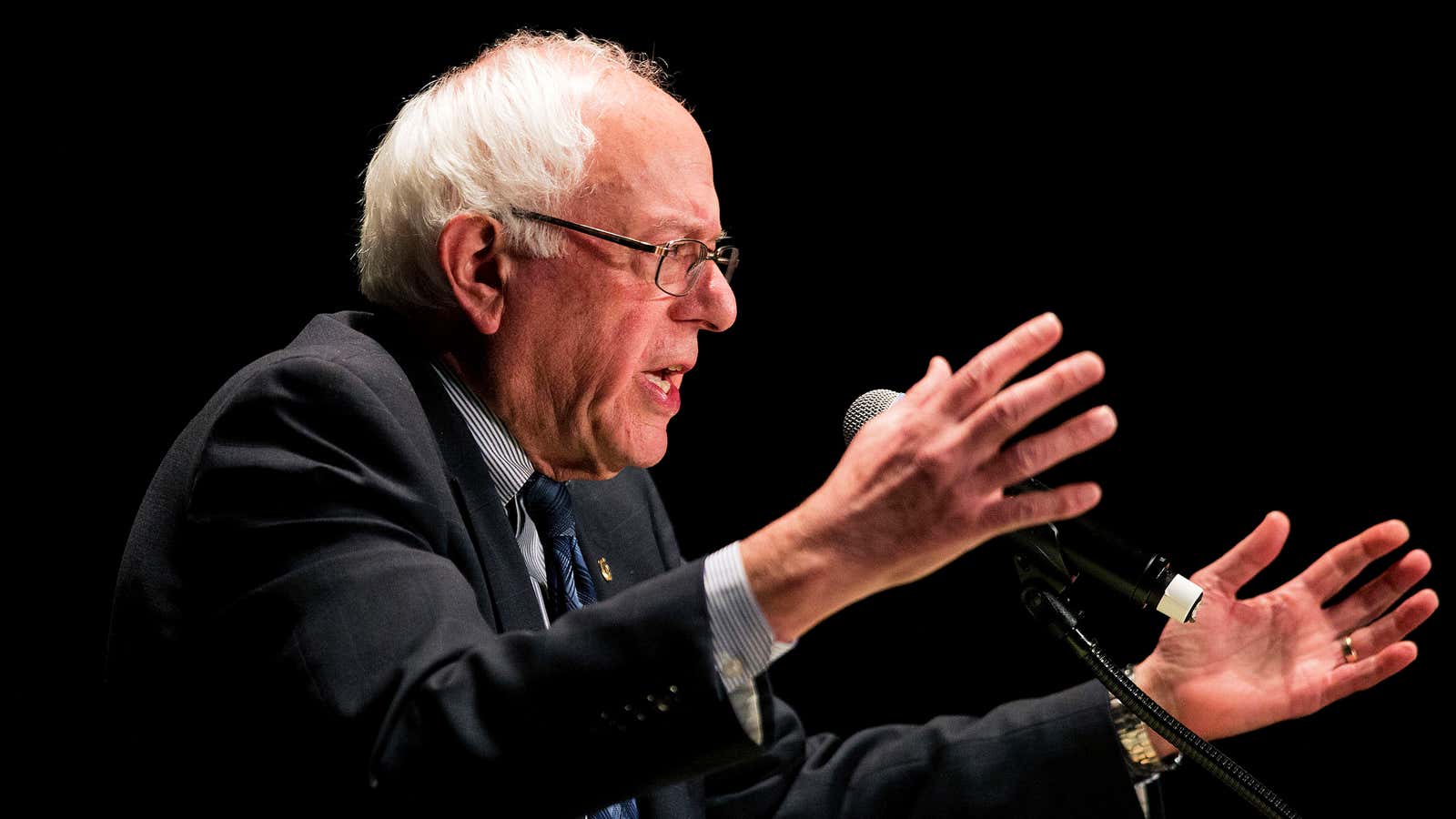“True freedom does not occur without economic security.”
Bernie Sanders, 2016 Democratic presidential candidate, delivered his latest campaign speech at Georgetown University on Nov. 19. Sanders is a politician, not a professor, but his speeches recently have taken on a distinctly educational cast. Mostly, they aim to teach Americans about democratic socialism, to dispel boogey-monster fears about the “s-word” and explain how it can be used to address America’s current social and economic woes.
The lessons he delivers to audience after audience are pretty much the same: economic inequality in America is severe and growing; the middle class has all but disappeared; the majority of new income generated today is going to the top 1% of Americans; the US is controlled by “a handful of billionaires.” His proposed solutions are familiar now, too: free universal healthcare, free college education, paid parental leave, higher taxes on the wealthy, banking regulations, a living wage.
But last Thursday, Sanders added a new dimension to his argument: the yawning gap between rich and poor has created a growing class of Americans, he suggested, who aren’t really free.
“People are not truly free when they are unable to feed their family,” he said. “People are not truly free when they are unable to retire with dignity. People are not truly free when they are unemployed or underpaid or when they are exhausted by working long hours. People are not truly free when they have no health care.”
It’s a provocative argument, not least because it suggests that the thing we take to be the cornerstone of American identity—freedom—isn’t actually enjoyed by many Americans. According to the 2014 Census, 47 million Americans live in poverty today, including 20% of all American children, and 36% of black American children. According to Sanders, these people have been barred from the individual liberty that is the birthright of every American citizen.
But is it true to say there is no liberty without basic economic security? And if so, has Americans’ conception of freedom as a mostly political condition been, in some sense, impoverished?
Sanders grounds his argument in former president Franklin Delano Roosevelt’s 1944 State of the Union speech. Addressing an America that he had helped pull up from the depths of the Great Depression, Roosevelt said, “We have come to a clear realization of the fact that true individual freedom cannot exist without economic security and independence. Necessitous men are not free men.”
He also called for a “second Bill of Rights,” one that would complete the promise of liberty outlined in the original Bill of Rights. If the first bill guaranteed the political rights necessary to freedom, the second would guarantee the economic rights. These included things like the right to a decent job; the right to pay adequate to provide food and clothing; the right to a decent home; the right to adequate healthcare; the right to protection from the economic fears of sickness and old age; and the right for businesses to operate in an atmosphere free from unfair competition and domination by monopolies. Roosevelt attempted to realize these rights through his New Deal programs. At the time, social security, the concept of the minimum wage, the 40-hour work week, job programs, and banking regulations were vilified by the far-right as radical measures. But as Sanders noted, today we see them as normal and reasonable; they have become, in his words, “the fabric of our nation and the foundation of the middle class.”
In fact, the idea that economic independence is essential to freedom and citizenship stretches back well before Roosevelt. Thomas Jefferson insisted that political liberty was safe only so long as a man wasn’t economically beholden to any other. Abraham Lincoln advocated “free labor,” the “just and generous and prosperous system which opens the way for all—gives hope to all, and energy, and progress, and improvement of condition to all.” What made labor “free,” in Lincoln’s view, wasn’t the worker’s voluntary agreement to work for a wage but the opportunity it gave him to eventually rise above wage-earning to self-employment and independence.
Michael Sandel, professor of government at Harvard University, points out in his 1998 book Democracy’s Discontent, that Lincoln and other leaders of his generation believed that a worker who was locked into dependence on an employer, who lived in poverty with no hope of improving his condition, wasn’t really a free man. In 1869, The New York Times went so far as to compare the factory system to “a system of slavery as absolute if not as degrading as that which lately prevailed at the South.”
Labor leaders deplored the cycle of poverty and suffering in which factory workers were trapped. But they also worried that the system undermined the civic capacities of workers, transforming independent, self-governing citizens into dependent slaves. How could democracy survive if a whole class of American men and women weren’t free?
Bernie Sanders is, in effect, posing the same question today. His claim that millions of Americans aren’t really free implies that American democracy is already broken and getting worse. Sanders’s answer to this problem is democratic socialism—creating “an economy that works for all, not just the very wealthy” and reforming a political system “which is not only grossly unfair but, in many respects, corrupt.”
In previous remarks, Sanders has tended to frame his economic proposals in terms of the success of Scandinavia’s welfare economies. His latest speech marks a significant turn away from all the Europhilia, however, rooting his vision instead in American beliefs about the basic nature of freedom. What Sanders wants to deliver is neither radically new nor radically un-American; it’s the old promise of American democracy that was never fully fulfilled.




